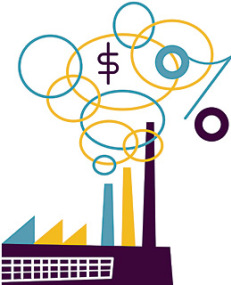You know, I may have been looking at the Basic Income + VAT wrong. Instead of using a value-added tax to fund the basic income, perhaps we should use a basic income grant to sell a different policy… the carbon tax!
Here’s what I have in mind: the US could adopt a revenue-neutral carbon tax. The goal would not be to fund any existinng social services: instead, the carbon tax would be pooled and remitted to all citizens equally. I’m not sure this would quite sustain life at a dignified level all by itself, but the ideal of a carbon tax is its incentive structure. By discouraging carbon-intensive consumption, we could eventually get greenhouse-gas emissions under control. But of course, taxes are unpopular, and growth-restrictive, and in general a bad sell.
So sell it with as a tax rebate. All citizens would be eligible for a tax refund from the carbon tax administrator. Unlike the tax, which would be paid mostly by industry, the refund would be flat and paid to citizens. So you could really win out if you used very few carbon-intensive products but still got your share of the overall carbon-tax refund. Your prices would not rise to meet your refund check. The rich who used massive carbon-intensive goods like yacht and jet fuel would pay quite heavily, while only receiving the same flat refund, while the rich who spent their money on solar panels and electric cars would find that their investments in clean energy had serious dividends!
The tax refund removes the regressive features of a carbon tax, while helping to achieve the requisite internalization of market externalities. If we actually manage to seriously reduce carbon emissions, the tax refund itself would become lower and lower, so this isn’t exactly a replacement for a basic income. But unlike a basic income, this seems like a possibility in the current political… ahem… climate.
But what do I know about the “possible”? It turns out Richard Nixon, of all people, proposed a guaranteed income plan to replace welfare… in 1969! It was called the Family Assistance Plan — FAP. I think I see why it failed:
While the initial “start-up” costs of this program are higher than our present welfare costs, I am confident that we can afford this program and that it is consistent with a responsible fiscal policy. I would not support the program unless that were the case. It is my view, in fact, that responsible fiscal policy demands rapid welfare reform, for such reform will enable us to make significant long-run savings. The question is not whether we can afford this legislation, but whether we can afford to go on without it.
Now why does this sound familiar? In its particulars, the Nixon bill required the kind of welfare-to-work schemes we saw in the Clinton-era welfare reforms. So labor opposed it, and conservatives couldn’t unify around it, and so it went away:
No one expected the work requirement to work, least of all the President. “I don’t care a damn about the work requirement,” he told Moynihan, “This is the price of getting $1,600.” Again, as McGovern belatedly found out, the only way to promote welfare changes was to call them workfare.
But the price Nixon paid for a vague and unstructured work requirement was to exacerbate liberal fears. Mothers of small children, it was argued, might be ordered to work regardless of the adequacy of day-care facilities or the appropriateness of the job. To make matters worse, hard-won rights of judicial review for welfare recipients would have been curtailed by the Nixon bill.
Evaluating these fears is a problematic task, which Moynihan does not systematically attempt. In a thick, complicated book he finds little space for the detailed arguments raised by the liberal opposition. His focus, instead, is on motives. The liberals, he charges, could not permit fundamental change in the welfare system for they were too beholden to their constituencies of social workers, self-seeking spokesmen for the underprivileged and existing welfare recipients in high-payment states.
A more sympathetic phrasing could be constructed on the same evidence. F.A.P. offered epochal gains for the Southern poor at the price of a change in the rules with uncertain consequences for the mothers and children on welfare in the North. Liberals chose to be strategically conservative.

Second Opinions